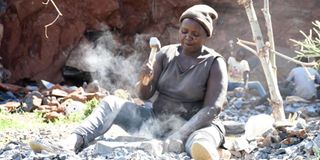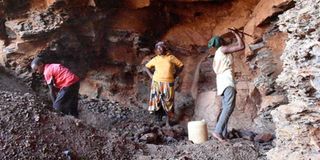The daring mothers risking it all in a quarry

Angelina Gateti, a mother of three, at a quarry near Isiolo International Airport roadblock on December 11, 2020.
What you need to know:
- A quarry that was initially dominated by men now has a handful, with women increasingly taking up the risky job that entails extracting and crushing the stones into ballast.
- The work is so challenging and poorly rewarding, says one woman.
- Apart from the risk of being hit by stones and developing eye complications due to the dust, their children are also exposed to cold as their mothers come to the quarry early in the morning in order to produce larger quantities of ballast and earn something substantive.
A 25-minute drive past Subuiga junction in Meru County towards Isiolo welcomes you to the border of the two counties – the Isiolo International Airport junction manned by police officers.
While one hardly notices a slight change in temperatures after crossing over to Isiolo side, sounds of stone crushing from the opposite side of the airport diversion rarely go unheard.
About 50 metres from the roadblock along the Matercare Road within the border line is a quarry where residents from both counties mostly women, work.
The quarry that was initially dominated by men now has a handful, with women increasingly taking up the tiresome and risky job that entails extracting and crushing the stones into ballast.
No face shield
A visit to the site offers a glimpse of how daring women have become to make ends meet and most importantly, provide for their children.
We meet Ann Nkirote crushing the stones with her six-month-old son lying next to her. She has no face shield and is not worried the pieces of stones could hit the child forcefully enjoying the heat from the scorching sun.
“He (child) is used to being hit by the small pieces of stones but what do I do?” she poses.
“I am not happy doing this work but have no option as my child needs to be taken care of besides other family expenses.”
Poorly rewarding
Three metres away is Neema Kananu who is trying to calm her crying two-year-old son so that she resumes work.
She started working at the quarry after separating with her husband while the child was barely three months old. This work is so challenging and poorly rewarding, she says.
“I have come with him (son) here since he was three months old and though challenging, I have no alternative. I hope things will work out one day,” says Ms Kananu.
Apart from the risk of being hit by stones and developing eye complications due to the dust, the children are also exposed to cold as their mothers come to the quarry early in the morning, in order to produce larger quantities of ballast and earn something substantive.
The first thing the women do when they arrive at the quarry is get into a hollow space where they dig a huge stone, crush it into sizes they are able to carry, then transport it to their working area; where the crushing takes place.

Women at work: Mothers crush ballast stones at a quarry near Isiolo International Airport roadblock to earn a living.
A two-kilogram can of ballast fetches Sh15 and the mothers who report to work at 8am and leave at 6pm, produce nearly 10 kilos, bagging Sh150 daily though the major client who comes to the quarry with a lorry, pays them after every two weeks. Thus they earn about Sh3,000 a month, paid in batches of Sh1,500 after every two weeks.
After producing the ballast, the workers at the quarry, who are about 50, combine their produce and sell in tonnes. A lorry goes for Sh5,000. They then share the money based on the kilograms each one produced.
Ms Angelina Gateti, a mother of three, has worked at the site with her husband for the last 10 years. She is among those who have felt the brunt of the risky venture.
“My husband recently escaped with injuries after the place he was extracting the stone caved in. We all had to stop and help him out. He was lucky he survived,” she says.
In the wake of Covid-19, she says, the number of customers has reduced and that her family was at some point, forced to sleep on empty stomach and even struggled to pay rent.
Unable to get another job, Ms Gateti resolved to join her husband at the quarry, pool resources and pay school fees for their daughter who is in Class Five.
Maximise output
Most of the women at the quarry are either separated from their husbands, or are single mothers.
With delays in payment, the mothers are sometimes forced to assist in loading the ballast onto lorries, an engagement that earns them at least Sh20, enough to buy milk and food for their children.
To maximise their output, the women occasionally invite their children in primary school to assist them crush the stones.
Judie Kaberia, Gender Media Trainer at the Voice for Women and Girls' Rights, said, "Being economically empowered means a woman is putting something on the table. She contributes to supporting the family. This helps reduce the economic stress of the main breadwinner and as we know, this has been a major contributor to GBV.
"An economically empowered woman has the freedom to make decisions including walking out of a violent relationship. We have seen that most women stay in toxic relationships because they cannot take care of themselves."





